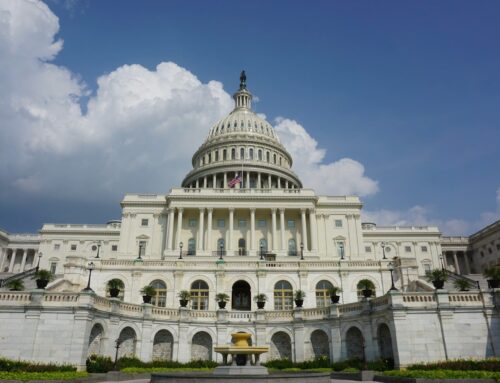It’s spending season in Washington. While all the players are jamming away, none are singing from the same sheet. The House is busy adopting huge megabus packages of Fiscal Year 2020 spending bills in a rush to meet their self-imposed July recess deadline for adopting the dozen bills that fund the government. Over in the Senate, well not so much. There have been hearings on the president’s budget request. But actually putting pen to paper on the spending bills? We haven’t seen anything yet.
There’s an argument for both approaches. Fiscal Year 2020 starts October 1st, which, when you consider a week-long Fourth of July recess and month-long August recess, isn’t too far off. So, the House is trying to beat that clock.
On the other hand, the House is adopting detailed spending bills without knowing the total amount of cash they actually have available to spend. Right now, the FY2020 budget caps set by the Budget Control Act of 2011 (BCA) are the law of the land. The level for both defense and non-defense are considerably lower than what was allowed in FY2019 (though as we like to point out, more than was allowed in FY2017, just a few years ago). So, with that in mind, the Senate’s more cautious approach could be appropriate. After all, if the total allowed spending is less than the House currently envisions, there will be some cutting from programs and priorities that were promised more. Trust us, you will hear howls of pain (real or perceived) from the special interests behind those programs.
What really needs to happen is a budget deal. And one that is offset, not like the Bipartisan Budget Act of 2018 that just piled on $300 billion more debt. But after several meetings the Democratic House, Republican Senate, and Republican White House can’t come up with a deal. Nobody likes the BCA, but nobody has the guts (or offsets) to scrap it even though gimmicks are used to dodge the caps left and right. It’s gotten so ridiculous that just this week, the White House proposed that instead of hammering out a deal, a year-long continuing resolution funding government at FY2019 levels for the next year should be adopted.
C’mon. The fourth quarter of FY2019 has not even begun. Throwing the nation’s budgetary hands in the air this early is not only preposterous, it’s lazy.
First, if all could agree on keeping funding at FY2019 levels, then you could just draft spending bills that abide by that limit. Lawmakers could prioritize and wouldn’t need to fund every agency and program exactly as they were funded last year. Second, CRs are generally used to buy time to get a budget deal or finish bills without making taxpayers suffer through a full or partial government shutdown. There are more than 100 calendar days before the end of the fiscal year, so a shutdown isn’t an immediate threat. Third, the CR would provide no predictability for the FY2021 budget amount because that pot of cash is also subject to the BCA caps. The BCA level in FY2021 is less than what was spent in FY2019. And lastly, a one-year CR would punt the budgetary decisions into the 2020 elections.
There’s one other critical element involved in these talks – the debt ceiling. The debt limit was suspended until earlier this year. On March 2nd, the debt ceiling was set at the then federal debt level. The Department of Treasury has said that they could use “extraordinary measures” to avoid busting the limit until the fall. The administration offered to suspend the debt ceiling for another year. Policymakers must not play chicken with the debt ceiling and risk the full faith and credit of the U.S. Treasury. Debt service costs are already staggering and will only get worse if bond purchasers worry about the credit worthiness of Uncle Sam.
After the most recent failure in budget talks, Treasury Secretary Mnuchin stated: “The president has every intention of keeping the government open.” That makes the administration’s one-year CR and debt ceiling suspension appear to be more about posturing regarding a blame game over a potential government shutdown than reality. That’s good because at this point kicking the budget and debt ceiling can a year down the road is not only ridiculous, it’s dumb. Instead of posturing and politicking, the President, Senate, and House should cancel their summer vacation and get their job done.










Get Social